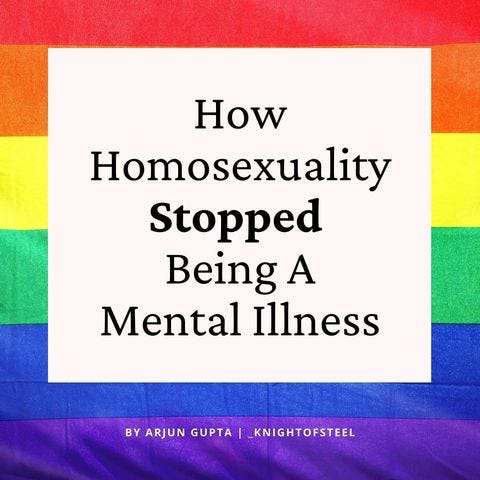Robert Spitzer: The Man Who Removed Homosexuality as a Mental Illness
His story is not as straight forward as it seems.
Hey everyone! It’s pride month so succumbing to the pressure of economic demands, I am exploring the relationship homosexuality has had with psychiatry and psychology in the past.
Psychology has had a very…iffy relationship with homosexuality. After all, it was only 50 or so years ago that psychologists and psychiatrists offered therapy for homosexuality in their clinics. Some still promise the same in their clinics, albeit covertly!
Last year, I made a post on my Instagram handle and credited Dr. Robert Spitzer with the removal of homosexuality from the Diagnostic and Statistical Manual.
Before that, psychiatry was largely driven by psychoanalysis (Freudian thought) and homosexuality was lumped in with necrophilia, pedophilia and other sexual deviancies. Psychiatrists of the time, fed up with the slowness of psychoanalysis, wanted something new. They wanted structure. Spitzer offered them that.
Spitzer believed that if social dysfunction was a criteria for something being a disorder, we should have racism, vegetarianism or radical behaviour as disorders as well. Clearly, it is not the homosexual people who are dysfunctional by themselves, but the social pressure which makes them so. His arguments were vital in the removal of homosexuality as an illness…but that is not what this story is about.
The Rise of Spitzer
In the mid-70s, Spitzer was put in charge of editing and creating the third edition of the DSM. At the time, the position did not mean much. After all, the DSM was just a collection of disorders and their possible causation. It was not meant to be anything more. Spitzer wanted to change that. He wanted to create an objective and reliable collection of symptoms which a practitioner could use to diagnose a mental disorder and that….is where this story truly begins.
The Totalitarian Power of Robert Spitzer
Spitzer decided to create committees who would collect researches on a particular disorder and recommend its inclusion or exclusion into the DSM. One of the key conferences on the findings of these committees took place in Boston which gets murkier every time you look at it.
The whole conference had been sponsored by the company responsible for making Xanax, the most popular anti-anxiety medication today. When asked about why the company was so interested in psychiatric diagnoses, the CEO was direct and clear. “Money, money and money.”
Interestingly enough, Spitzer pushed the DSM-III to include the term ‘disorder’ next to each psychiatric diagnosis. This meant an “Anxiety reaction” turned into “anxiety disorder”, “depressive neurosis” turned into “depressive disorder” and so on. When aksed why he did that, he was frank and straightforward.
The Death of Psychotherapy and Birth of PMDD
Spitzer wanted to remove psychoanalysis and psychotherapy as possible forms of treatment for what he considered were “psychiatric” disorders that could/should only be treated by medicines/psychiatrists.
Did he pave the way for pharma companies to become such a mainstay in modern psychiatry? Probably yes. He thought that if an illness could be treated by a medicine (even if the evidence was flimsy) it should get included in the DSM.
the addition of new conditions to the DSM was in part “a function of ‘Do you have a treatment’? If you have a treatment, you’re more interested in getting the category in” (qtd. in Shyness 75 as in this blog by Lane, 2016)
One of those proposed disorders (as per DSM-IIIR)? Pre-menstrual dysphoric disorder. (PMDD) which was supposed to be the pathologization of PMS that women experience before periods. Incidentally, (?) just when the disorder was proposed, pharma companies were preparing a promotion campaign for pills that they said could reduce PMS problems. Shady, isn’t it?
That wasn’t all.
Spitzer Cures Homosexuality
In 2001, Spitzer published a paper where he claimed that gay people could be “cured”. He claimed he had been collecting data from ex-gay men and firmly believed that in highly-motivated individuals, homosexuality could be reversed.
It was only in 2011 that it was found that the research included participants linked with radical ‘ex-gay groups’ and that Spitzer had personally recruited these specific individuals instead of going through it systematically. The research was immediately recanted once these facts came to light. Spitzer was considered the most influential psychiatrist of the 20th century at the time (probably still is) but this was a major blow to his credibility.
How Do We Remember Him?
Was Spitzer a revolutionary who changed psychiatry forever? Was he a liberator who fought for gay rights? Or was he a psychiatrist who was given too much power? Did he get influenced by the money of drug companies?
It is hard to paint in him one color. Human beings are complex that way. Even the man who was responsible for removal of homosexuality as an illness may not have been doing it out of compassion for the oppressed but as a tool of political diplomacy.
In politics, as in daily life, convenience often trumps compassion.
And that is it for this week! How did you think this was? I wanted to write a special story for pride month and I was surprised when I saw that a person who would otherwise be considered a hero among the LGBT community was not as much of a hero as we thought.
What would you do if you were in Spitzer’s position? Would you use your power to shape the world in your image or would you wait for better evidence to emerge, even if it takes decades to come?
Let me know in the comments or by replying to this email :)







It was very informative and insightful :)
I would wait for better evidence to emerge. Also impressive information as usual :)))